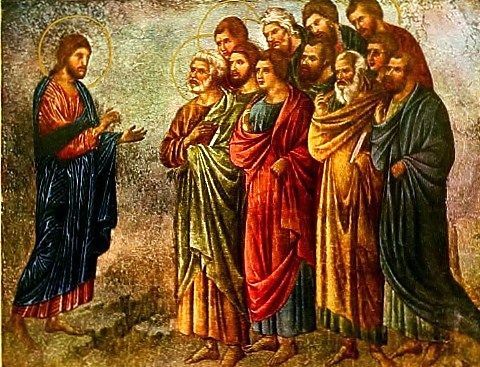Recently, my good friend asked me, "Does your church believe in the Apostles' Creed?" So, I figured -- this is a perfect time for an analysis. Yay! Put on your seatbelts and enjoy the ride.
As a general rule of thumb my church does not believe in the call and response tradition we see in many Christian churches. This is where the pastor reads from a script, and at the appropriate time the congregation responds. I saw this when I went to an Episcopalian summer camp. They have a book of prayers, and also a calendar as to which prayers need to be read on a specific day.
Much of the material comes straight from the Bible, but some pieces were created after the genesis of the original Church. These are summaries and commentaries based on scripture, which may or may not be in harmony with the original scriptures. My Church doesn't recognize any of these later artifacts, mainly because they didn't exist with the Original Church (first century).
My church also sees these call and response traditions as "vain repetitions" (Matthew 6:7). The concern is that if you keep repeating the same words, they may become meaningless sounds recited by rote. So, instead of call and response, the standard Latter-day Saint church service concentrates on discussions and instruction that apply to our everyday life.
As for creeds, the closest we have is a set of 13 Articles of Faith. We're supposed to know them, but even these don't get recited in our church services. Knowing them is not a prerequisite for salvation, but they do serve as a good summary to help guide us in our paths.
What this all means is that most Latter-day Saints don't know the Apostle's Creed exists. It's not from the Bible, and didn't show up regularly until somewhere around the 3rd to 5th centuries. I only knew of this creed from visiting Episcopalian and other church services. And I do have to admit that today I've learned more about this Creed in a one-hour research session than I have in my entire life. For example, I didn't know that it has 12 lines, each one supposedly coming from a different apostle.
So, here goes -- let's see what the Creed says ... (I'm using the version presented in Wikipedia, though I see in that same article that slightly different versions also exist) ...
#1) I believe in God the Father almighty, maker of heaven and earth,
Yes -- we believe this. There may be some nit-picky differences in details, but in principle this is correct. Where we might differ: we believe that Jesus (the Son) was already in existence at the time, and that He helped the Father to create our world.
#2) and in Jesus Christ, his only Son, our Lord,
Yes -- and again there are tiny details. The Father is Elohim, and the Son is Jehovah, the last of which is often translated as LORD in the Old Testament. Though the term LORD and GOD can be interchangeable between the two entities, we tend to use LORD to refer specifically to Jesus (the Son).
#3) who was conceived of the Holy Spirit and born of the Virgin Mary,
#4) who suffered under Pontius Pilate, was crucified, died, and was buried,
#5) descended into hell, rose again from the dead on the third day,
#6) ascended into heaven and is seated at the right hand of God the Father almighty,
#7) who will come again to judge the living and the dead.
These are all straight from the Bible -- so yes, this is all true. In fact, each of these are very important aspects of Jesus that should always be remembered. I should point out that so far, any member of my church would be in full support of all these lines, and we're taught all this in our youth.
#8) I believe in the Holy Spirit,
Yes -- and I should further point out: my church sees the Father, the Son, and the Holy Spirit as three distinct entities, one in purpose. The Apostles' creed seems to support the idea that these three are separate in being -- though I suppose it could also apply to the Trinity concept as well (where the Three are different manifestations of the same being).
#9) the holy catholic Church, the communion of saints,
This one is kinda funky, because it has that "catholic" word in there. It threw me off the first time I ever read this, but then I learned the word "catholic" is lower-case, meaning "universal." In fact, that's where the name of the Catholic Church comes from. It is supposed to be the One True Church that is the same here, there, and everywhere.
We believe in the One True Church as well. But of course, you'd probably guess that we disagree as to the identity of that Church. (What good is a church that doesn't claim to be that One True Church?)
But then again, all of our many denominations branch from the same Original Church of Jesus Christ. We can't logically all be "right" with all our differing nit-picky points of views, but in our fundamental beliefs, we are probably more than 95% in sync. The One Truth is indeed eternal and "catholic," and each of our churches are given a portion of that Truth. We all have the same core beliefs.
The second clause is also very important. Some believe that we don't need church, but rather just a relationship with God. However, my church teaches that this relationship is nothing without our relationships with our fellow friends and family. The "Church" is US, under the direction of God. We meet together, learn, and help each other. And this is the "communion of saints."
One more minor detail -- I see "saints" here being defined as "followers of Christ." This is the same meaning of the word in "Latter-day Saints." Thus we can see that even in the name of our church, the concept of Church and communion is very important to us.
#10) the forgiveness of sins,
#11) the resurrection of the body,
Again, these are core Christian doctrines straight from the Bible. So, yes. About the resurrection, we believe that this is a literal, physical resurrection, and not figuratively.
And finally ...
#12) and the life everlasting. Amen.
Most definitely -- we see our goal in life is to obtain the life everlasting that Jesus has promised.
In summary, even though most Latter-day Saints don't know what the Apostles' Creed is, they'd most likely believe its precepts. They'd probably get stuck on #9 with that "catholic" word, but when the meaning is explained, they would then nod their heads in agreement. Some nit-picky differences exist in the periphery, but in principle, this Creed may indeed be a good representation of the core doctrines that unite ALL Christian denominations.
For comparison, I invite you to check out our 13 Articles of Faith. In particular, the first 4 are very similar to the Apostles' Creed.
I hope you've enjoyed this quick analysis. In a couple of weeks, I'll release the next installment of the Adventures of Elder Elder and Elder Benjamin. Until then, keep on searching for truth!

